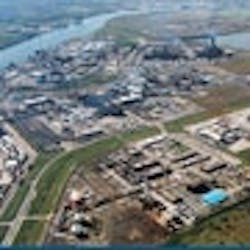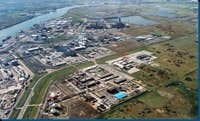Multi-national specialty chemicals producer Degussa Evonik was finding it increasingly difficult and expensive to support a legacy control system in one of its production buildings at its Seal Sands site, Teesside, U.K. The “multi-purpose multi-product” facility makes active ingredients for the pharmaceutical industry. Problems with the obsolete system included its batch manager failing when multiple batches were run through the plant and unreliable supporting communications. In addition, it was based on a now-aging Unix hardware and software platform, which led to ongoing development issues compounded by limited availability of expertise both within Degussa and from external suppliers to rectify matters. Crucially, this lack of support also would hamper implementing changes required for manufacturing new products.
The challenge, therefore, was to find a control system for the production building that would meet a number of criteria, including: increasing manufacturing output by optimizing batch manager operations; improving overall reliability of production process; reducing the complexity of the system; optimizing levels of expertise and experience that could be brought to bear; installing the new system quickly and without undue impact on existing operations; and providing ongoing flexibility to carry out process modifications to meet future production demands.
After a front-end engineering design study completed by the company and its long-time systems integrator QSI, Degussa opted for the Siemens PCS7 OS control system. The plan was to maintain existing production building controllers but replace the SCADA front end with the new control system. This approach offered the advantage of requiring only limited modification to the legacy controller configuration, while the complete replacement of the graphics and batch manager would improve the reliability of both areas, which were key elements that had to be addressed. The solution also provided cost benefits and enabled a swift and timely system migration.
Degussa Evonik, Seal Sands site,
Teesside, U.K.
Importantly for Degussa, the complete system is driven from a single source of supply via Siemens. Tools within the system also provide for a proceduralized approach to software development for future expansion of the particular production building. In addition, Siemens’ training courses enabled the Degussa workforce to become well versed in the PCS7 OS system.
The PCS7 OS was swapped over and tested within a three week period during the end of 2007. Reliability issues in the production building have now been solved and Degussa has seen both an improved availability and an increase in throughput.
“This is an integrated solution that is actively supported and developed by Siemens,” says Jeremy Hands of QSI. “It was installed quickly with minimal disruption to the existing operations, and it now means that Degussa’s previous unreliable production experience with the building in question has been addressed. We are now moving forward with Degussa looking at a number of new projects. Looking to the future, as Siemens continue to develop the capability of PCS7, further upgrades can be easily and swiftly implemented, giving Degussa peace of mind that their chosen route is the right one not only for the present, but also for their changing needs into the future.”
Ian Heathcock is a business development manager for Siemens Automation & Drives, Manchester, U.K. E-mail him at [email protected].

